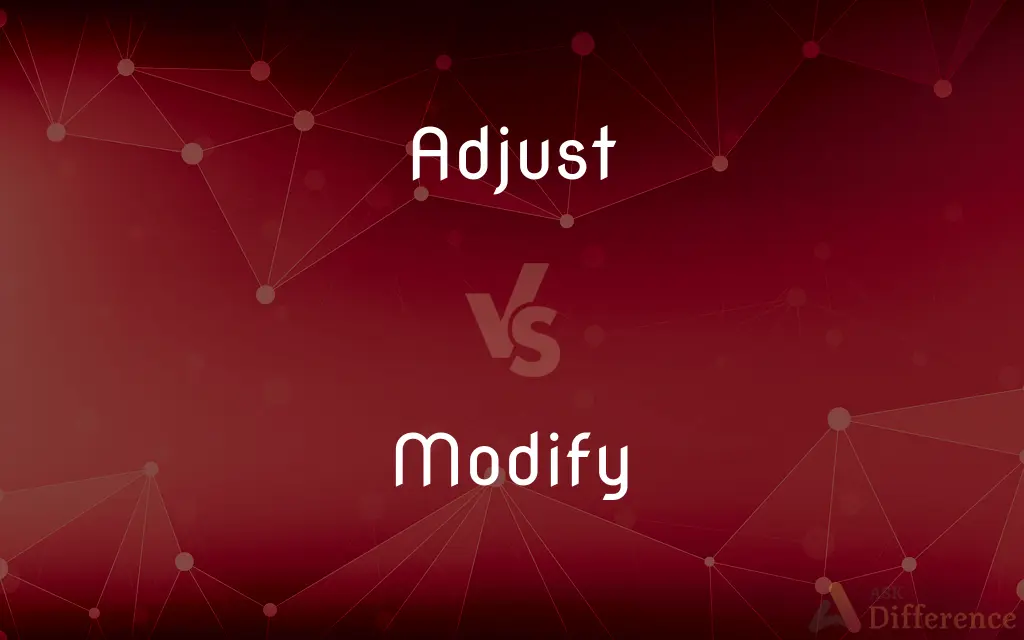Adjust vs. Modify — What's the Difference?
"Adjust" means to make small changes to something to achieve a desired fit or outcome, implying fine-tuning. "Modify" entails making alterations to something, which can range from minor to significant changes, suggesting a broader scope of alteration.

Difference Between Adjust and Modify
Table of Contents
ADVERTISEMENT
Key Differences
Adjusting typically involves making slight, precise alterations to improve performance, fit, or appearance. For example, one might adjust the settings on a device to optimize its functionality or adjust a piece of clothing for a better fit. On the other hand, modifying something usually implies more substantial changes that alter the original structure, function, or form. Modifying a car, for instance, could involve changing parts to improve performance or appearance, which significantly alters its original state.
While adjustment is often about achieving accuracy or fine-tuning within existing parameters, modification can involve expanding or redefining those parameters. Adjustments are commonly made in response to specific needs or conditions and are generally considered part of regular maintenance or usage. In contrast, modifications are typically planned and executed to meet new requirements, enhance functionality, or update an item according to personal preferences or technological advancements.
The intent behind adjusting is usually to ensure optimal performance or correct minor issues, ensuring that something works as intended or fits within certain expectations. Conversely, the aim of modification is often to improve, customize, or update something, which might involve creative or innovative approaches that significantly change the original concept or design.
In technical and mechanical contexts, adjustments are crucial for precision and accuracy, such as adjusting the tension in a machine part. Modification in these contexts might involve reengineering or redesigning components to serve new purposes or to significantly enhance performance, going beyond simple adjustments to achieve a higher level of change.
Despite their differences, both adjusting and modifying are essential processes in various fields, from technology and engineering to fashion and personal development. Each serves a unique purpose, whether it's making fine-tuned adjustments to optimize functionality or making broader modifications to adapt to new challenges or preferences.
ADVERTISEMENT
Comparison Chart
Definition
To make small or minor changes for fine-tuning.
To make alterations or amendments, possibly significant.
Scope
Limited, often involving fine-tuning or minor corrections.
Broader, can involve substantial changes or alterations.
Purpose
To achieve optimal performance, fit, or appearance.
To improve, update, or customize beyond original parameters.
Nature
Often temporary, reversible, or part of regular maintenance.
Can be permanent, transformative, or involve innovation.
Examples
Adjusting the settings on a watch, adjusting seat position.
Modifying a car's engine, modifying software code.
Compare with Definitions
Adjust
Fine-tune settings for optimal performance.
She adjusted the volume to her preference.
Modify
Make substantial changes to improve or update.
They modified the software to include new features.
Adjust
Modify marginally within existing parameters.
He adjusted his speech based on the audience's reaction.
Modify
Customize to suit personal preferences or needs.
She modified her bike to better fit her height.
Adjust
Alter slightly for a better fit or alignment.
The tailor adjusted the fit of the jacket.
Modify
Transform the structure or function.
Modifying a car's exhaust system for better performance.
Adjust
Correct or adapt to specific requirements.
The device automatically adjusts to ambient light.
Modify
Alter significantly from the original state.
The team modified the project plan to meet new objectives.
Adjust
Change position or condition to achieve balance.
Adjusting the furniture to maximize space in the room.
Modify
Revise or amend a document or plan.
The contract was modified after negotiations.
Adjust
To move or change (something) so as to be in a more effective arrangement or desired condition
Adjust the timing of a car's engine.
Adjust a hearing aid to amplify lower frequencies.
Modify
Make partial or minor changes to (something)
She may be prepared to modify her views
Adjust
To change so as to be suitable to or conform with something else
Adjusted the schedule to allow for everyone's vacation plans.
Adjusted the old monetary figures to account for inflation.
Modify
To change in form or character; alter.
Adjust
In chiropractic medicine, to manipulate (the spine and other body structures) to treat disorders and restore normal function of the nervous system.
Modify
To make less extreme, severe, or strong
Refused to modify her stand on the issue.
Adjust
To decide how much is to be paid on (an insurance claim).
Modify
(Grammar) To qualify or limit the meaning of. For example, summer modifies day in the phrase a summer day.
Adjust
To become adapted or accustomed, as to a new situation
Have you adjusted to working with your new colleagues?.
Modify
(Linguistics) To change (a vowel) by umlaut.
Adjust
(transitive) To modify.
Morimoto's recipes are adjusted to suit the American palate.
Modify
To be or become modified; change.
Adjust
(transitive) To improve or rectify.
He adjusted his initial conclusion to reflect the new data.
Modify
(transitive) To change part of.
Her publisher advised her to modify a few parts of the book to make it easier to read.
Adjust
(transitive) To settle an insurance claim.
Modify
(intransitive) To be or become modified.
Adjust
(intransitive) To change to fit circumstances.
Most immigrants adjust quickly to a new community.
She waited for her eyes to adjust to the darkness.
Modify
(transitive) To set bounds to; to moderate.
Adjust
To make exact; to fit; to make correspondent or conformable; to bring into proper relations; as, to adjust a garment to the body, or things to a standard.
Modify
To qualify the meaning of.
Adjust
To put in order; to regulate, or reduce to system.
Adjusting the orthography.
Modify
To change somewhat the form or qualities of; to change a part of something while leaving most parts unchanged; to alter somewhat; as, to modify a contrivance adapted to some mechanical purpose; to modify the terms of a contract.
Adjust
To settle or bring to a satisfactory state, so that parties are agreed in the result; as, to adjust accounts; the differences are adjusted.
Modify
To limit or reduce in extent or degree; to moderate; to qualify; to lower.
Of his graceHe modifies his first severe decree.
Adjust
To bring to a true relative position, as the parts of an instrument; to regulate for use; as, to adjust a telescope or microscope.
Modify
Make less severe or harsh or extreme;
Please modify this letter to make it more polite
He modified his views on same-gender marriage
Adjust
Alter or regulate so as to achieve accuracy or conform to a standard;
Adjust the clock, please
Correct the alignment of the front wheels
Modify
Add a modifier to a constituent
Adjust
Place in a line or arrange so as to be parallel or straight;
Align the car with the curb
Align the sheets of paper on the table
Modify
Cause to change; make different; cause a transformation;
The advent of the automobile may have altered the growth pattern of the city
The discussion has changed my thinking about the issue
Adjust
Adapt or conform oneself to new or different conditions;
We must adjust to the bad economic situation
Adjust
Make correspondent or conformable;
Adjust your eyes to the darkness
Adjust
Decide how much is to be paid on an insurance claim
Common Curiosities
Are adjustments always necessary?
Adjustments are often necessary for optimal functionality, fit, or comfort, but their necessity varies with context.
Is modifying always a physical process?
No, modifying can also refer to changes in non-physical entities, like software code or plans.
Can something be modified without being adjusted first?
Yes, modifications can be made independently of adjustments, especially if the changes are significant or transformative.
Is it possible to over-adjust something?
Yes, over-adjusting can lead to inefficiencies, imbalances, or further issues, underscoring the need for precision.
Is adjusting always less significant than modifying?
Typically, yes, adjusting involves less significant, more precise changes, whereas modifying implies more substantial alterations.
Do adjustments require technical skills?
Some adjustments might require technical skills, especially in complex systems, but many are simple and user-friendly.
Are modifications always permanent?
While many modifications are permanent, some can be reversible, depending on the nature of the change and the object involved.
How do adjustments and modifications differ in software?
In software, adjustments might involve tweaking settings or preferences, while modifications could involve changing the code or adding features.
Can modifications enhance the value of an item?
Well-executed modifications can enhance an item's value, especially if they improve functionality, aesthetics, or desirability.
Can an adjustment become a modification?
Yes, if adjustments lead to significant changes or deviate greatly from the original state, they might be considered modifications.
How do modifications affect warranties?
Modifications, especially significant ones, can void warranties if they alter the product's original design or function.
Can adjustments improve the longevity of a device?
Regular adjustments can maintain optimal functionality and potentially extend a device's longevity.
Can both adjustments and modifications be DIY projects?
Many adjustments and some modifications can be DIY projects, though the complexity and risks vary widely.
How do adjustments relate to calibration?
Adjustments can be part of calibration processes, ensuring devices operate within desired parameters or standards.
Do professionals always need to make modifications?
Not always, but professional expertise is often required for complex modifications, especially those involving safety or functionality.
Share Your Discovery

Previous Comparison
Call vs. Toot
Next Comparison
Proofed vs. Proved














































